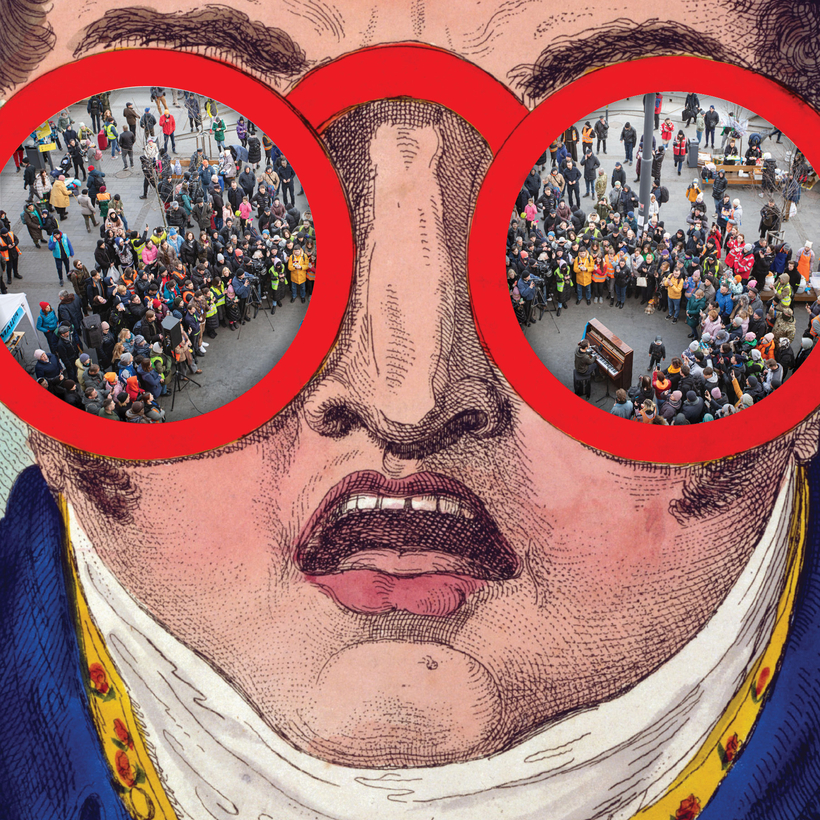His name is Sviatoslav Vakarchuk.
But, in Ukraine, everyone calls him “Slava” …
There, he’s an icon and a hero.
It seems that he, too—before Zelensky—considered running for president.
And, if he didn’t do it, his fans did it for him and obliged him to declare solemnly, a few months before the election, that he would not cross the Rubicon but rather remain devoted to his art.
Because the one and only passion of this man, who is also a thinker, a distinguished scientist, and, yes, a former member of Parliament, is obviously music.
Those who don’t know him so well yet might see him as a sort of Sting or Springsteen, with a body and a voice cut from the same cloth as these titans who revived Anglo-American rock.
But there are many others who know him much better.
There are those who have heard him sing for the soldiers in the trenches of Donbas.
Those who don’t know him so well yet might see him as a sort of Sting or Springsteen.
There are those who’ve heard him with his group, Okean Elzy, at the Brandenburg Gate, in Berlin, where the history of Europe, its empires and their collapses, its barbarities and deliverances, seemed to echo him.
There are the lucky ones, myself included, who saw him in Kyiv’s Freedom Square in 2014 and, a few weeks ago, at one of the biggest halls in Paris, performing “Zeleni Ochi” (Green Eyes): the huge stage evoking a High Mass; the crowd dancing and breathing in unison; band members with wild manes and guitars flying in the smoke; pure rock fire; Slava, with his steely body and solid head, his mouth both crooked and graceful, leaping like a tiger onto a platform; and then, bare-chested, not like Jesus but like Leonardo’s Vitruvian Man, he spreads his arms and calls on the crowd to applaud as hard and as fearlessly as he is doing. That’s Slava’s magic.

There are those who must settle for watching the YouTube video posted for the Venice Biennale: the courtyard of an immense Baroque building, ocher brown, ruined; the rubble, wires exposed, metal bars and rails, bullet marks; in the background a wrought-iron gate with delicate curves, a tribute to the spirit of cities we had thought of as eternal Europe; seen from below, a sky in which one cannot tell what is powdering the clouds or the flame from a fire; and in this end-of-a-world setting, a pianist, a quavering string quartet, and the voice of Vakarchuk rising up: “Obiymi mene … kiss me … kiss me again … stay in my arms … kiss me”; what better to sing when one is a member of a people trying to stay human while exposed to the lightning of inhumanity? What better than a ballad circling about its refrain when one is seeking a bulwark against hate, against the missile that is about to land, against chaos and utter destruction?
For all these people, Slava Vakarchuk is like no one else.
He is himself, one of our last rockers and one of the last epic poets of our age.
Ultimately there are two kinds of poetry: Orphic and lyric.
The Orphic variety keeps to itself, haughty, revolving around its own words: Stéphane Mallarmé and T. S. Eliot come to mind.
The lyric variety seeks contact, connection, and accord with others large and small, others with hearts as bare as the poet’s own, through feelings simple and deep: a French reader thinks of Guillaume Apollinaire’s “Nuit Rhénane,” his Poems of Peace and War, or François Villon’s “Ballad of the Hanged.”
He is himself, one of our last rockers and one of the last epic poets of our age.
And within this latter category, there is the rare animal that is the poet both lyric and epic: the Greeks called this person a bard; the early French, a troubadour; he is the one who, like an emissary without a scapegoat or a courier without a warrant, takes charge of the destiny of a people through the mystery of his words, voice, body, and presence.
That is what Vakarchuk does for the Ukrainian people.
Like Louis Armstrong with his gravelly voice, in which the martyrdom and the resurrection of Black Americans found their nostalgic synthesis.
Like Bono using his hoarse harmonies to bind him, once and for all, to the bloody body of his beloved Ireland.
Yes, like them, Slava accomplishes the miracle of simplifying without sacrificing meaning—isn’t this the secret of the bard?
Like them, with the textural luxuries proper to rock, Slava has mastered the technique of inspired depletion, of the ruthless cutting away of fat, that makes for the perfect refrain, summit of song and lyric, total and minimal art, turning on itself like an oxymoron to which clings the spirit of a time, a young generation, a people.
This is no matter of nationalism.
Just a body leaping into a place of sweat, blood, and slaughter.
Just a voice raspy and gentle, between tenor and baritone, with a clear layer devoid of vibrato; a voice that has no time to listen to itself because it always seems on the edge of breaking; a granite voice that, in addition to loving and weeping, roars the roar of a determined, vibrant, living country determined to go on living.
Just a bard who has chosen—he wasn’t always this way, but so he is today—to sing only in the language of the persecuted, the bombarded, the tormented.
For all these reasons, Slava is the soul of Ukraine.
Bernard-Henri Lévy is a philosopher, writer, and filmmaker who has visited Ukraine seven times since the Russian invasion


